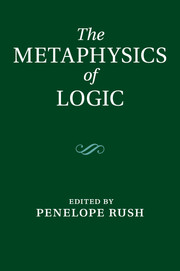Book contents
- The Metaphysics of Logic
- The Metaphysics of Logic
- Copyright page
- Dedication
- Contents
- Contributors
- Introduction
- Part I The Main Positions
- Part II History and Authors
- Part III Specific Issues
- Chapter 12 Revising logic
- Chapter 13 Glutty theories and the logic of antinomies
- Chapter 14 The metaphysical interpretation of logical truth
- References
- Index
Chapter 13 - Glutty theories and the logic of antinomies
from Part III - Specific Issues
Published online by Cambridge University Press: 05 October 2014
- The Metaphysics of Logic
- The Metaphysics of Logic
- Copyright page
- Dedication
- Contents
- Contributors
- Introduction
- Part I The Main Positions
- Part II History and Authors
- Part III Specific Issues
- Chapter 12 Revising logic
- Chapter 13 Glutty theories and the logic of antinomies
- Chapter 14 The metaphysical interpretation of logical truth
- References
- Index
Summary
- Type
- Chapter
- Information
- The Metaphysics of Logic , pp. 224 - 232Publisher: Cambridge University PressPrint publication year: 2014
- 2
- Cited by



